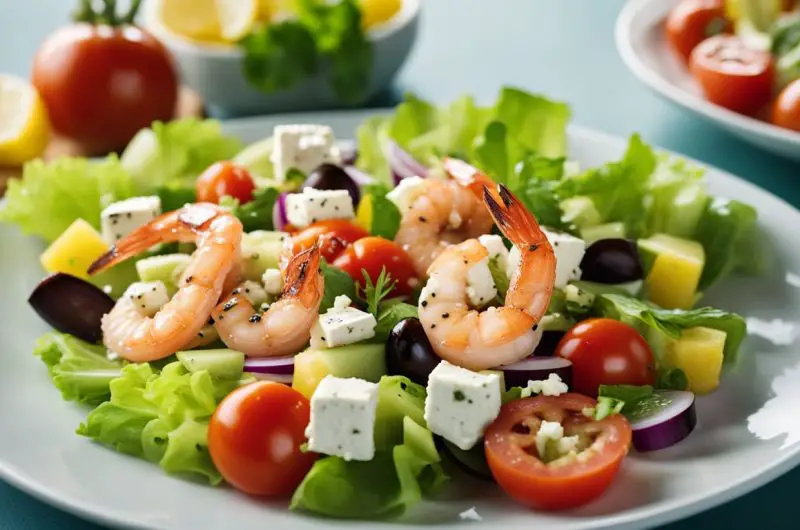Greek Salad with Grilled Shrimp is a delicious and healthy meal that is perfect for any occasion. This salad is made with fresh vegetables, succulent shrimp, and a tangy dressing that is sure to please everyone. Whether you are looking for a quick and easy lunch or a satisfying dinner, this Greek Salad with Grilled Shrimp is a great choice.
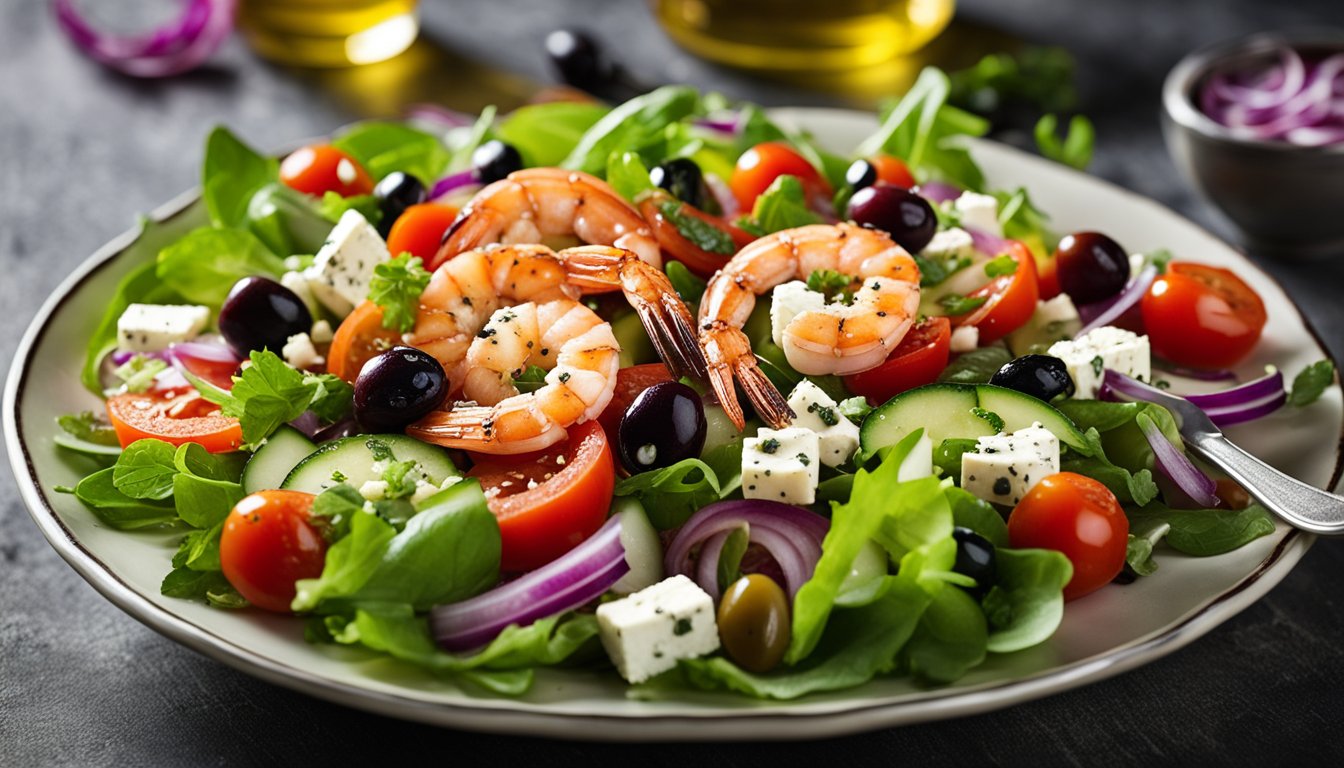
Greek Salad has a long history that dates back to ancient Greece. It was originally made with simple ingredients like tomatoes, cucumbers, and feta cheese, and was served as a side dish. Over time, the salad has evolved to include a variety of other ingredients, including olives, onions, and peppers. Today, Greek Salad is a popular dish all around the world, and is enjoyed by people of all ages and backgrounds.
Key Takeaways
- Greek Salad with Grilled Shrimp is a healthy and delicious meal that is perfect for any occasion.
- The salad has a long history that dates back to ancient Greece and has evolved over time to include a variety of ingredients.
- When preparing the salad, it is important to select fresh ingredients, properly prepare the shrimp, and assemble the salad with care.
History of Greek Salad

Greek Salad, also known as Horiatiki, is a traditional dish that originated in Greece. It is a staple of the Mediterranean diet and is enjoyed by many people around the world. The salad is typically made with fresh vegetables, feta cheese, olives, and a simple vinaigrette dressing.
The origins of Greek Salad can be traced back to ancient Greece, where it was a popular dish among the peasants. It was a simple and nutritious meal that was made with whatever vegetables were in season. Over time, the dish became more widely known and was eventually adopted by the upper classes.
The modern version of Greek Salad that we know today was first introduced in the 20th century. It was originally made with only tomatoes, cucumbers, onions, and feta cheese. However, over time, other ingredients such as olives, peppers, and lettuce were added to the mix.
Today, Greek Salad is a popular dish in many countries around the world. It is often served as a side dish or as a main course, and can be found in many Greek restaurants and Mediterranean-style cafes. With its delicious combination of fresh vegetables and tangy dressing, it is a healthy and flavorful option for anyone looking for a light and refreshing meal.
Nutritional Value of Greek Salad
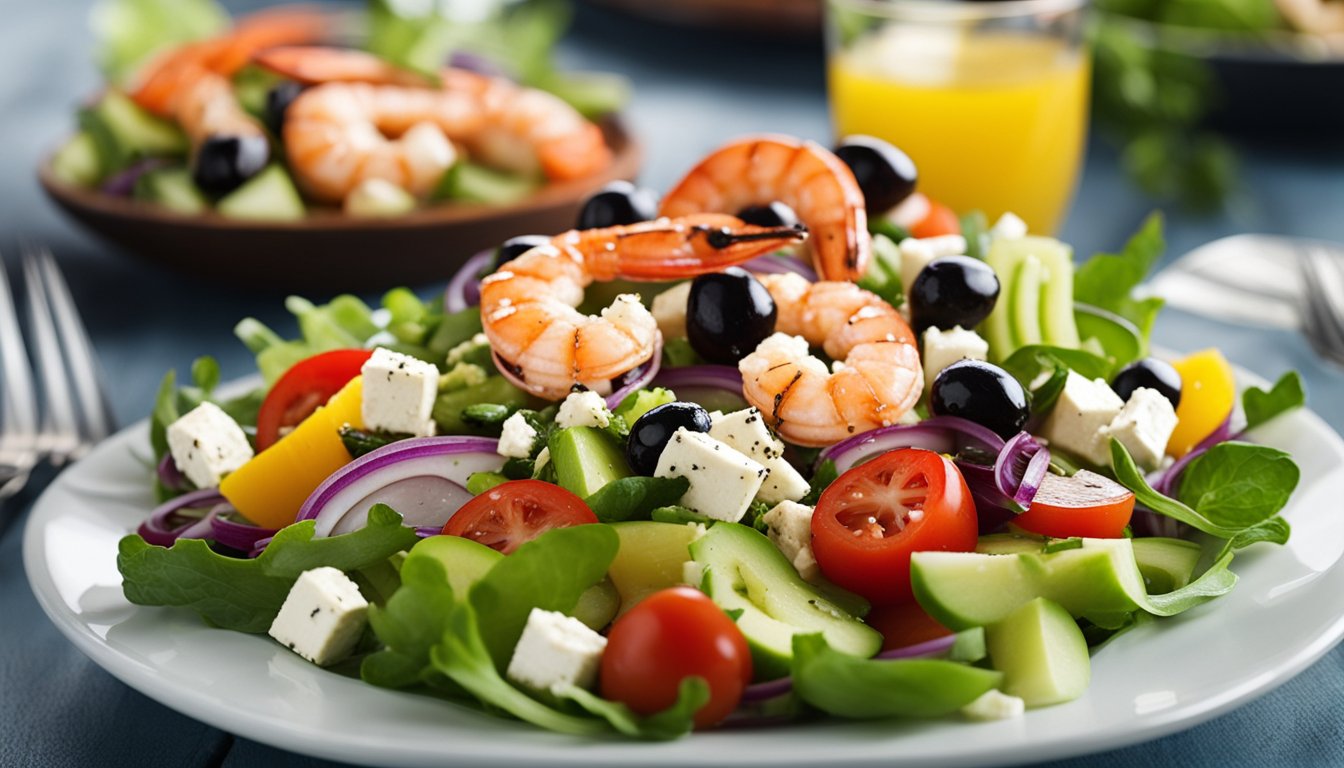
Greek Salad is a healthy and nutritious dish that is packed with essential nutrients. It is a perfect combination of fresh vegetables, feta cheese, olives, and a light dressing. Adding grilled shrimp to the salad increases its protein content, making it a complete meal.
Here is a breakdown of the nutritional value of Greek Salad with Grilled Shrimp:
Calories
A serving of Greek Salad with Grilled Shrimp (150g) contains approximately 200 calories. This makes it a low-calorie meal option for those who are watching their weight.
Protein
Adding grilled shrimp to the salad increases its protein content. A serving of Greek Salad with Grilled Shrimp contains approximately 20g of protein, which is essential for muscle growth and repair.
Fiber
Greek Salad is a rich source of dietary fiber. A serving of Greek Salad with Grilled Shrimp contains approximately 4g of fiber, which helps in maintaining a healthy digestive system.
Vitamins and Minerals
Greek Salad is a great source of vitamins and minerals. It is rich in Vitamin C, Vitamin A, and Iron. The feta cheese and olives in the salad provide a good dose of calcium and healthy fats.
Sodium
Greek Salad contains a moderate amount of sodium. It is important to keep an eye on the sodium content, especially for those who have high blood pressure.
Overall, Greek Salad with Grilled Shrimp is a healthy and nutritious meal option that is easy to prepare. It is a great way to incorporate more vegetables and protein into your diet.
Selecting Ingredients for Greek Salad
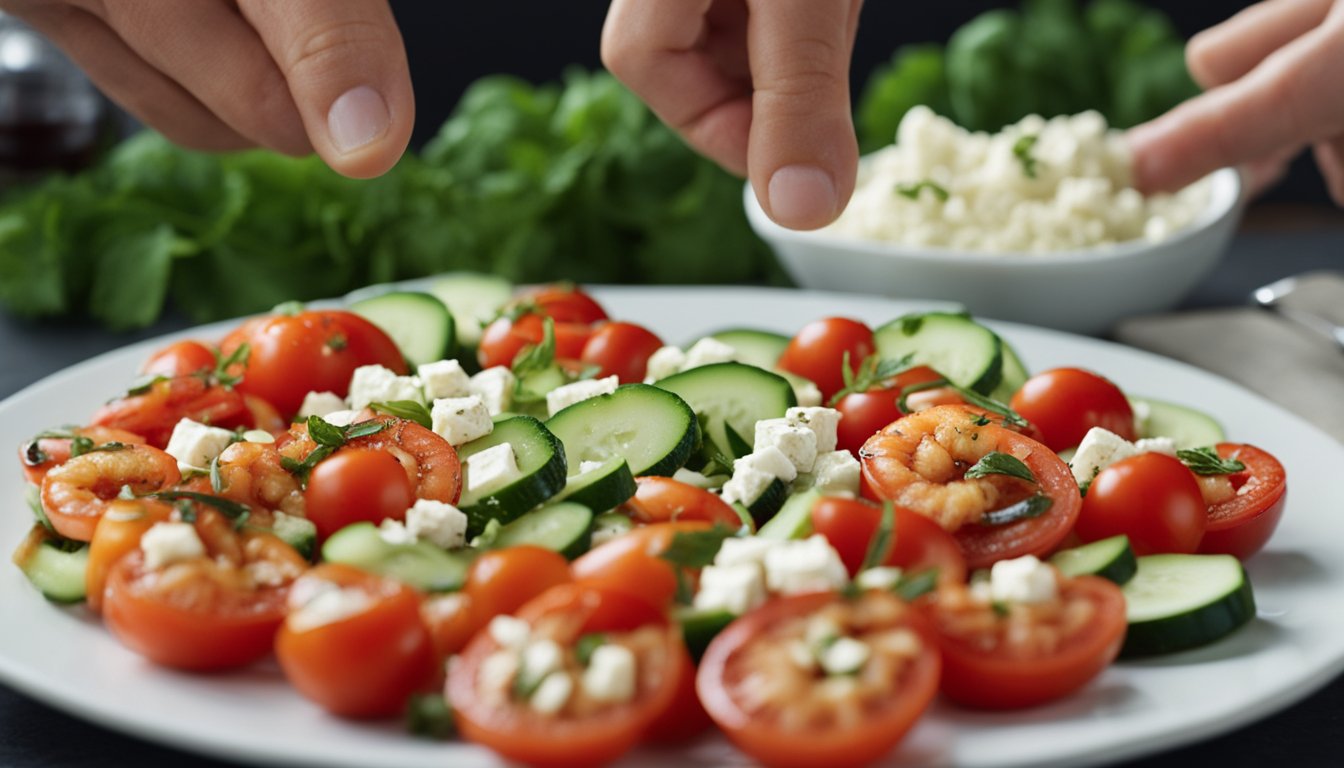
When making a Greek salad with grilled shrimp, selecting the right ingredients is crucial to ensuring a delicious and authentic flavor. Here are some key ingredients to consider:
Vegetables
The base of any Greek salad is fresh vegetables. Tomatoes, cucumbers, and red onions are essential ingredients that provide color, texture, and flavor. It is important to choose ripe, firm tomatoes and crisp cucumbers for the best results. Red onions should be thinly sliced to avoid overpowering the other ingredients.
Cheese
Feta cheese is a staple in Greek cuisine and a must-have ingredient for a Greek salad. Its salty and tangy flavor pairs perfectly with the fresh vegetables. When selecting feta cheese, look for a block of cheese rather than crumbled to ensure its freshness.
Olives
Kalamata olives are another essential ingredient in a Greek salad. They add a briny and salty flavor that complements the other ingredients. When selecting olives, choose ones that are plump and shiny with a firm texture.
Grilled Shrimp
Grilled shrimp is a delicious addition to a Greek salad and adds a protein boost. When selecting shrimp, look for fresh, firm shrimp with a slightly sweet smell. It is important to properly clean and devein the shrimp before grilling to ensure a safe and enjoyable eating experience.
By selecting high-quality ingredients, a Greek salad with grilled shrimp can be a healthy and flavorful meal option that is perfect for any occasion.
Preparing the Grilled Shrimp
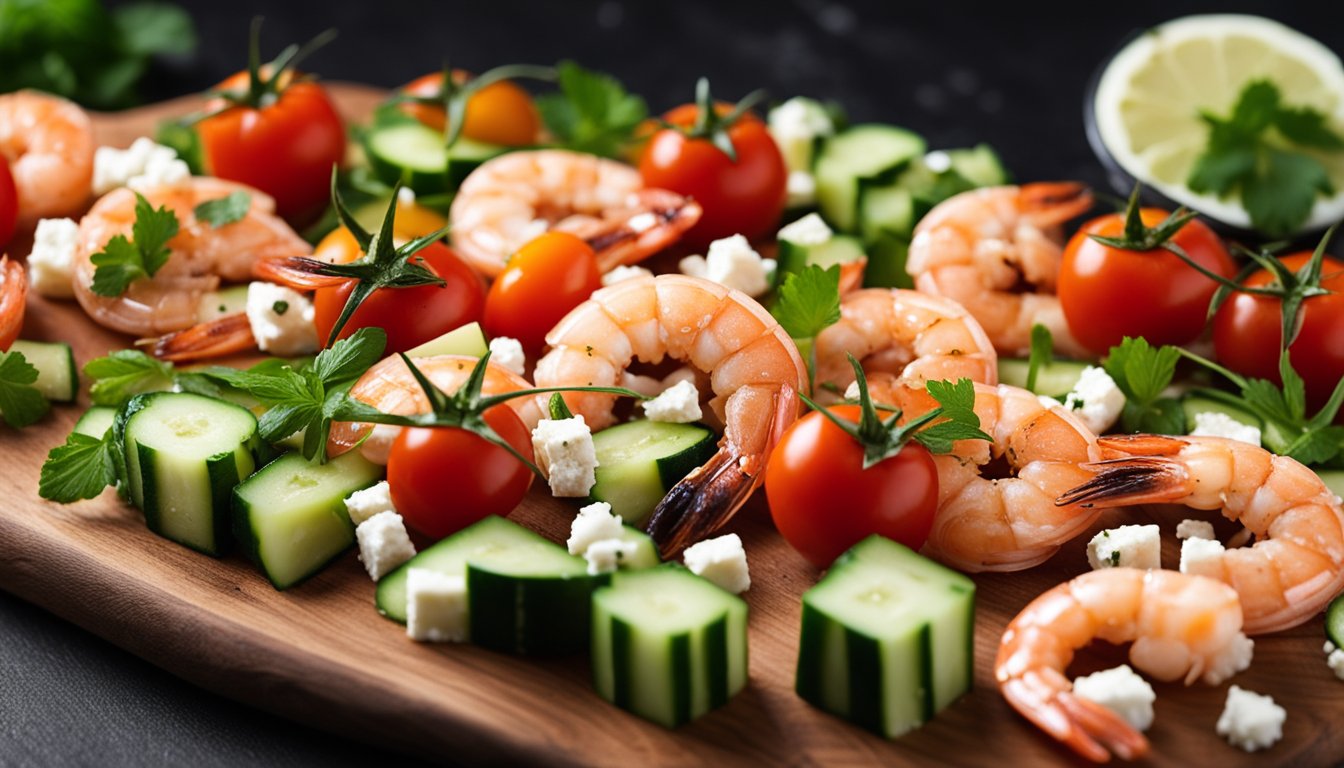
Marinating the Shrimp
Marinating the shrimp is an essential step in preparing grilled shrimp. It helps to infuse the shrimp with flavors and tenderizes the meat. To marinate the shrimp, start by cleaning and deveining the shrimp. Then, prepare a marinade by mixing olive oil, lemon juice, garlic, salt, and pepper in a bowl. Add the shrimp to the marinade and toss to coat evenly. Cover the bowl with plastic wrap and refrigerate for at least 30 minutes or up to 2 hours.
Grilling Techniques
Grilling shrimp can be a delicate process, but with the right technique, you can achieve perfectly cooked shrimp every time. Start by preheating the grill to medium-high heat. Remove the shrimp from the marinade and thread them onto skewers, leaving a little space between each shrimp. This will help to ensure even cooking.
Place the skewers on the grill and cook for 2-3 minutes on each side or until the shrimp turns pink and slightly charred. Be careful not to overcook the shrimp as it can become tough and rubbery. Once cooked, remove the skewers from the grill and let them rest for a few minutes before serving.
In summary, marinating the shrimp and using the right grilling technique are crucial to achieving a flavorful and perfectly cooked grilled shrimp. By following these simple steps, you can elevate your Greek salad with grilled shrimp to a whole new level.
Assembling the Greek Salad
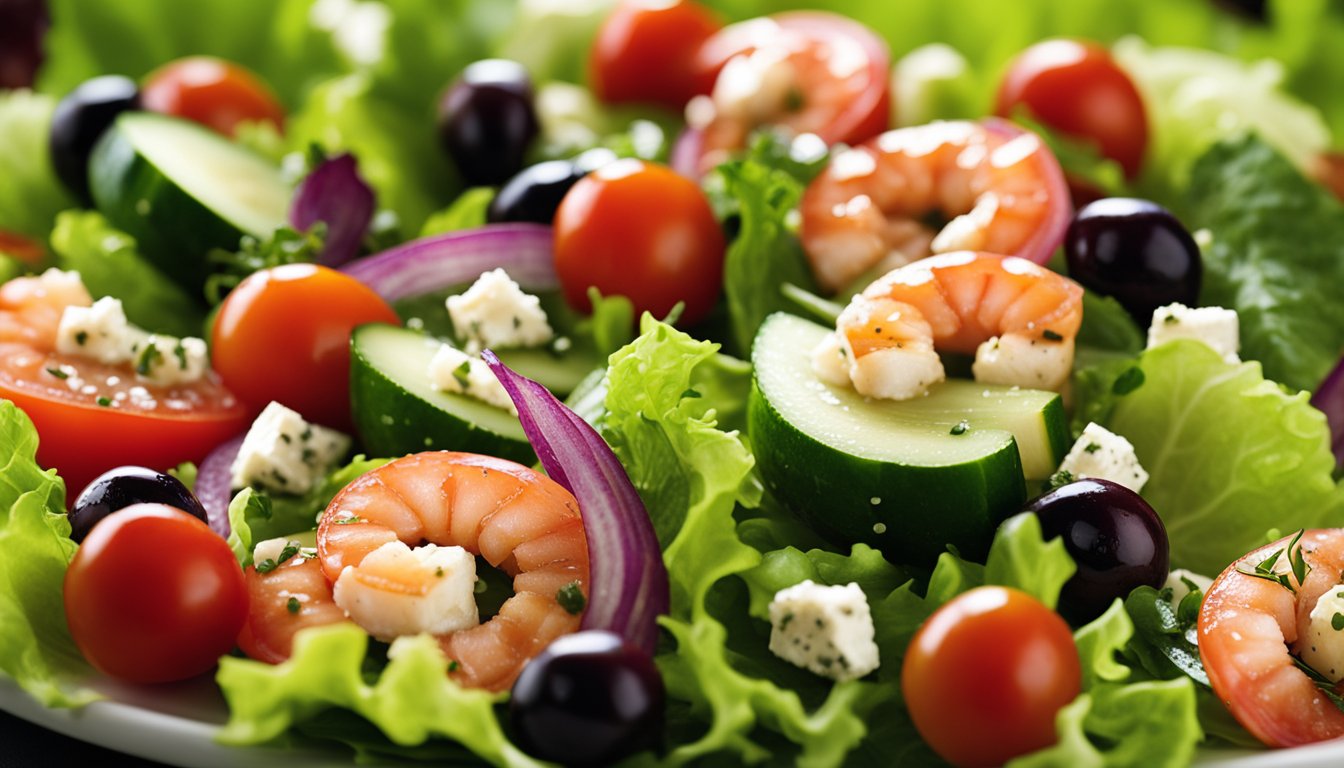
Chopping Vegetables
Before assembling the Greek salad, it is essential to chop the vegetables into small, bite-sized pieces. Begin by washing and drying the vegetables thoroughly. Cut the cucumber into thin slices and then quarter them. Cut the red onion into thin slices and separate them into rings. Cut the bell pepper into small pieces and remove the seeds. Cut the tomatoes into wedges. Finally, chop the fresh parsley and oregano.
Mixing the Salad
Once all the vegetables are chopped, it’s time to mix the salad. In a large bowl, combine the chopped cucumber, red onion, bell pepper, and tomatoes. Add a pinch of salt and pepper to taste. Drizzle extra virgin olive oil and red wine vinegar over the salad and toss.
Next, add the crumbled feta cheese and mix gently. Finally, add the chopped parsley and oregano and mix again.
To finish the salad, place it in a serving dish and top it off with the grilled shrimp. Serve immediately and enjoy the delicious flavors of this Greek salad with grilled shrimp.
Greek Salad Dressing
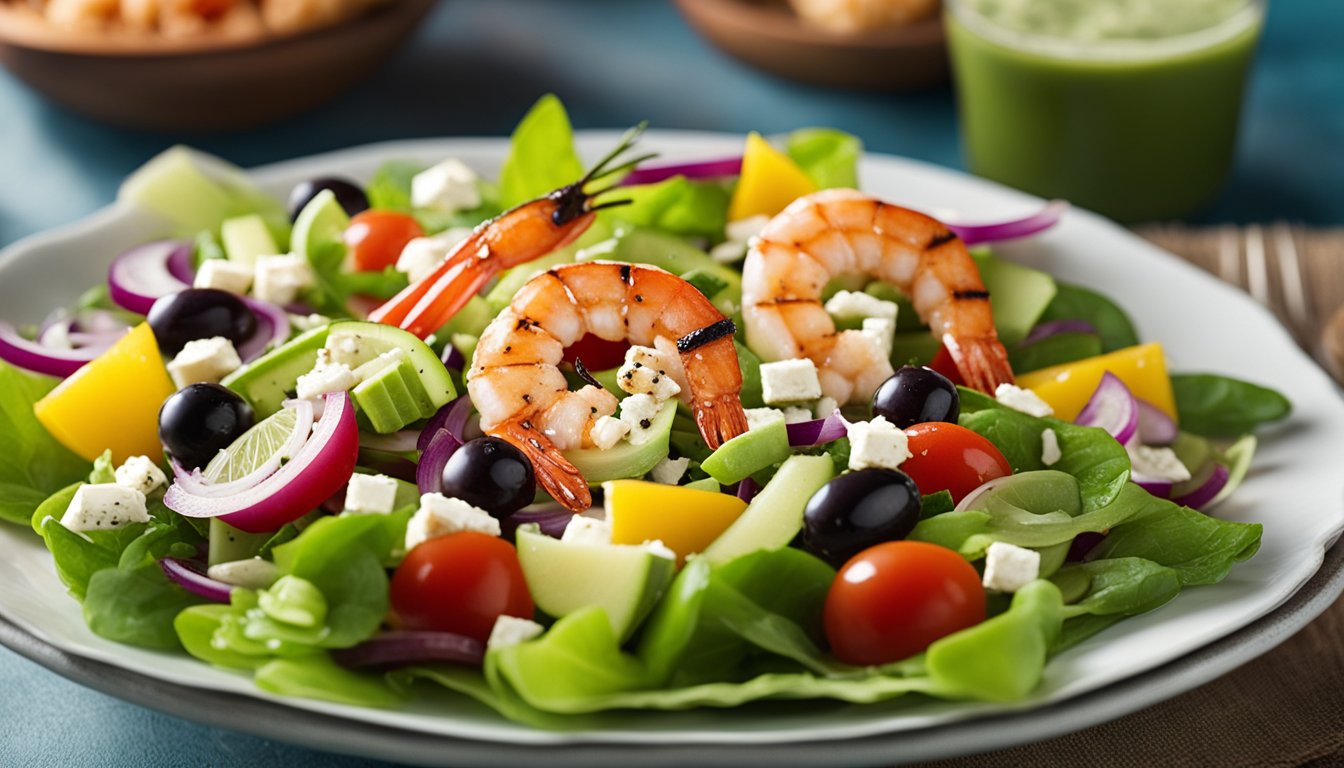
Making the Dressing
Greek Salad Dressing is a simple yet flavorful dressing that can be made in just a few minutes. To make the dressing, whisk together olive oil, red wine vinegar, lemon juice, garlic, Dijon mustard, dried oregano, salt, and black pepper. The dressing can be made ahead of time and stored in the refrigerator for up to a week.
Here is a simple recipe for Greek Salad Dressing:
Ingredients:
– 1 lb large shrimp, peeled and deveined
– 2 tbsp olive oil
– 1 tsp dried oregano
– Salt and pepper, to taste
– 6 cups mixed salad greens
– 1 cup cherry tomatoes, halved
– 1 cucumber, diced
– 1/2 red onion, thinly sliced
– 1/2 cup Kalamata olives, pitted
– 1/2 cup crumbled feta cheese
– Lemon wedges, for serving
Directions:
1. Preheat grill to medium-high heat.
2. In a bowl, toss shrimp with olive oil, oregano, salt, and pepper.
3. Thread shrimp onto skewers and grill for 2-3 minutes per side, or until shrimp are pink and cooked through.
4. In a large bowl, combine salad greens, cherry tomatoes, cucumber, red onion, and Kalamata olives.
5. Add grilled shrimp to the salad and toss gently to combine.
6. Sprinkle feta cheese over the top.
7. Serve with lemon wedges on the side.
- In a small bowl, whisk together olive oil, red wine vinegar, lemon juice, garlic, Dijon mustard, dried oregano, salt, and black pepper.
- Taste and adjust seasoning as needed.
Dressing Variations
Greek Salad Dressing can be customized to suit personal preferences. Here are some variations to try:
- Creamy Greek Salad Dressing: Add 1/4 cup of Greek yogurt to the dressing and whisk until smooth.
- Lemon Greek Salad Dressing: Increase the amount of lemon juice in the dressing to 1/2 cup and omit the red wine vinegar.
- Honey Greek Salad Dressing: Add 1 tablespoon of honey to the dressing and whisk until combined.
- Spicy Greek Salad Dressing: Add 1/4 teaspoon of red pepper flakes to the dressing for a kick of heat.
Experiment with different variations to find the perfect Greek Salad Dressing for your taste buds.
Plating and Presentation

When it comes to plating and presentation of the Greek Salad with Grilled Shrimp, there are a few key things to keep in mind. First, it’s important to use a large, shallow bowl or platter to allow the ingredients to be spread out and arranged in an appealing way.
Next, start by placing a bed of fresh greens, such as romaine lettuce or baby spinach, at the bottom of the dish. This will provide a base for the other ingredients to rest on and add some color and texture to the dish.
Arrange the grilled shrimp on top of the greens, spacing them out evenly and ensuring that they are visible and easy to access. You can also add some sliced avocado or cucumber to the dish to add some additional color and flavor.
Next, add the chopped vegetables, such as tomatoes, bell peppers, and red onion, in small piles around the dish. This will help to create a visually appealing presentation and ensure that each bite contains a variety of flavors and textures.
Finally, drizzle the dish with a generous amount of the homemade Greek dressing, taking care to distribute it evenly over all of the ingredients. You can also sprinkle some crumbled feta cheese over the top of the dish for added flavor and texture.
Overall, the key to a successful plating and presentation of the Greek Salad with Grilled Shrimp is to keep things simple, yet visually appealing. By arranging the ingredients in an attractive way and using a flavorful dressing, you can create a dish that is both delicious and visually stunning.
Pairing with Beverages
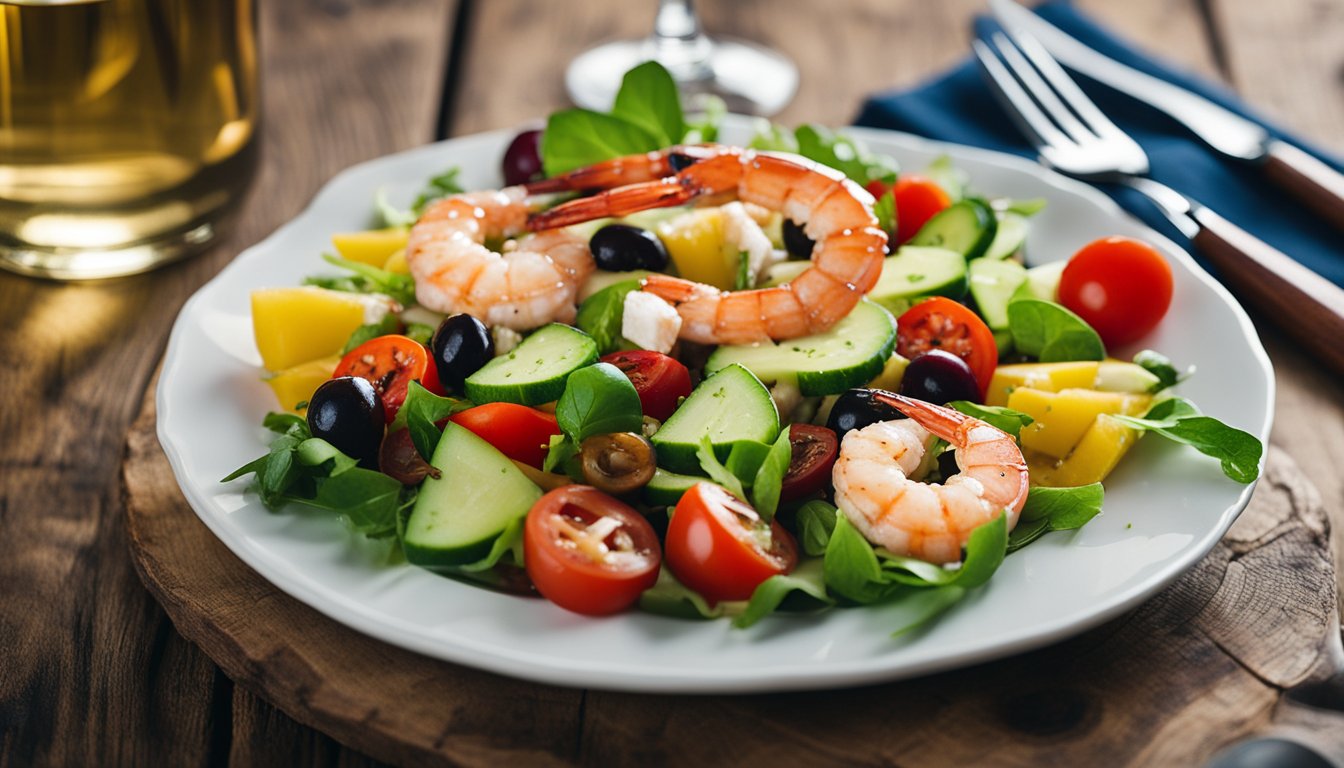
When it comes to pairing beverages with Greek Salad with Grilled Shrimp, there are several options that can complement the flavors of the dish. Here are some suggestions:
- White Wine: A crisp white wine such as Sauvignon Blanc or Pinot Grigio can be a great option to pair with this dish. The acidity in the wine can help cut through the richness of the feta cheese and the olive oil in the salad.
- Rosé: A dry rosé can also be a good choice to pair with this salad. The light and refreshing flavors of the wine can complement the grilled shrimp and the fresh vegetables in the salad.
- Beer: For those who prefer beer, a light and crisp lager or pilsner can be a good option. The carbonation in the beer can help cleanse the palate between bites of the salad.
- Iced Tea: If you’re looking for a non-alcoholic option, iced tea can be a refreshing choice. A simple iced tea with lemon can complement the flavors of the salad without overpowering them.
Overall, when pairing beverages with Greek Salad with Grilled Shrimp, it’s important to choose a drink that complements the flavors of the dish without overpowering them. With these suggestions, you can find the perfect beverage to enjoy with your salad.
Storing Leftovers
When it comes to storing Greek Salad with Grilled Shrimp, it’s important to follow some simple guidelines to ensure the safety and quality of the dish.
Firstly, any leftover shrimp should be removed from the salad and stored separately in an airtight container in the refrigerator. This will prevent the shrimp from becoming mushy and will also prevent any bacteria from spreading to the rest of the salad.
As for the salad itself, it can be stored in an airtight container in the refrigerator for up to 3 days. However, it’s important to note that the longer the salad sits, the more the vegetables will wilt and the flavors will meld together.
To keep the salad fresh for as long as possible, it’s recommended to store the dressing separately and only add it to the salad right before serving. Additionally, any ingredients that are prone to wilting, such as lettuce or cucumbers, should be added to the salad just before serving as well.
Overall, with proper storage techniques, leftover Greek Salad with Grilled Shrimp can be just as delicious as the day it was made.
Health Benefits and Considerations
Greek Salad with Grilled Shrimp is a healthy and nutritious dish that offers a range of health benefits. Here are some of the benefits of this dish:
- Low in calories: Greek Salad with Grilled Shrimp is a low-calorie dish that is perfect for people who are watching their weight. A typical serving of this dish contains around 300-400 calories, depending on the portion size.
- High in protein: Grilled shrimp is a great source of protein, which is essential for building and repairing muscles. A 3-ounce serving of grilled shrimp contains around 20 grams of protein.
- Rich in vitamins and minerals: Greek Salad with Grilled Shrimp is loaded with vitamins and minerals, including vitamin C, vitamin K, folate, potassium, and iron. These nutrients are essential for maintaining good health and preventing chronic diseases.
- Low in carbs: This dish is low in carbs, making it a great option for people who are following a low-carb or keto diet.
However, there are some considerations to keep in mind when consuming Greek Salad with Grilled Shrimp:
- High in sodium: Grilled shrimp is often seasoned with salt, which can increase the sodium content of the dish. People who are watching their sodium intake should be mindful of this.
- Potential allergen: Shrimp is a common food allergen, and some people may experience an allergic reaction after consuming it. If you have a seafood allergy, it’s best to avoid this dish.
Overall, Greek Salad with Grilled Shrimp is a healthy and delicious dish that offers a range of health benefits. By being mindful of the considerations listed above, you can enjoy this dish as part of a healthy and balanced diet.
Frequently Asked Questions
What are the typical ingredients in a Greek salad with grilled shrimp?
A Greek salad with grilled shrimp typically consists of fresh vegetables such as tomatoes, cucumbers, red onions, and bell peppers. It also includes Kalamata olives, feta cheese, and a dressing made with olive oil, lemon juice, and herbs. Grilled shrimp is added on top of the salad to complete the dish.
How do you prepare the dressing for a Greek salad?
To prepare the dressing for a Greek salad, combine olive oil, lemon juice, red wine vinegar, minced garlic, dried oregano, salt, and pepper in a bowl. Whisk until well combined. Alternatively, you can shake the ingredients together in a jar with a tight-fitting lid.
Can feta cheese be added to a Greek shrimp salad, and how?
Yes, feta cheese can be added to a Greek shrimp salad. Simply crumble the feta cheese and sprinkle it over the top of the salad before adding the grilled shrimp. Alternatively, you can mix the feta cheese into the salad before adding the shrimp.
What are the nutritional values of a Greek salad topped with grilled shrimp?
A Greek salad topped with grilled shrimp is a healthy and nutritious meal. The salad is low in calories and high in fiber, vitamins, and minerals. Grilled shrimp is a good source of protein and omega-3 fatty acids. Feta cheese adds calcium and flavor to the salad.
How can you incorporate rice into a Greek shrimp salad?
To incorporate rice into a Greek shrimp salad, cook the rice according to package instructions and let it cool. Add the cooled rice to the salad before adding the grilled shrimp. Alternatively, you can serve the Greek shrimp salad over a bed of cooked rice.
What are some variations of Greek salad that include seafood like shrimp or crab?
Some variations of Greek salad that include seafood like shrimp or crab are:
- Greek salad with grilled salmon
- Greek salad with seared scallops
- Greek salad with crab meat
- Greek salad with shrimp and avocado
These variations add a unique flavor and texture to the classic Greek salad and are perfect for seafood lovers.
